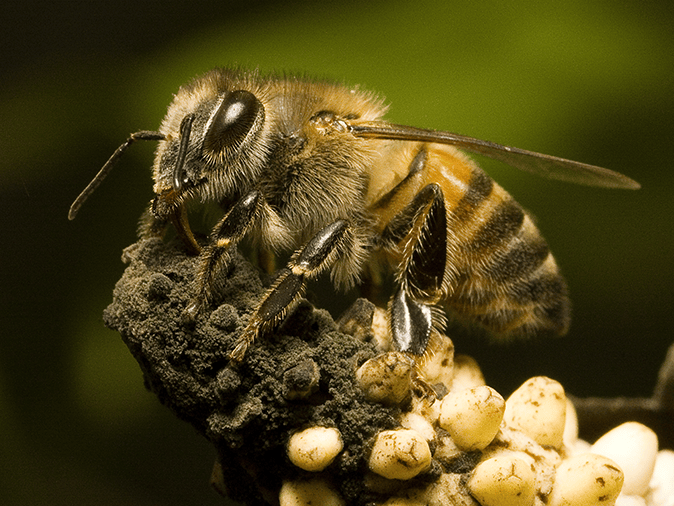
What Do Africanized Honey Bees Look Like?
The worker bee is responsible for protecting the hive, which will result in stinging if they feel the colony is being threatened. When they sting, the stinger, venom sac, muscle and other parts of their anatomy will separate from their body which results in their death.
They are 3/4 inch long, brownish color and slightly fuzzy.
They are usually found in a large cluster either as a swarm or part of an established hive.
When are africanized honey bees most active?
Life Cycle of the Africanized Honey Bee
Complete metamorphosis
Develop from an egg, larva, pupa to an adult. They are social insects that develop into a caste member. Workers develop in 21 days, live for 50 days, and are the majority of the colony population. They are responsible for hive construction, food foraging, honey production, feeding young and protecting the hive.
Drones develop in 24 days and live for 5-10 weeks. They reproduce with a queen. Queen develops in 16 days and lives up to 3 years. There is one living queen per colony responsible for egg production.
Habits of Africanized Honey Bees
- Diet: Nectar and pollen
- Activity: Work longer hours than other bees from dusk to late into the evening.
- Preferred Climate: Temperate climates
- Defense: Erratic flight, loud buzzing sound, sting in large quantities.
- Cautions: Bees will attack people approaching their nest within 10-50 feet. Leave the area and contact professionals to come and assess the area and remove bees. Listen for buzzing and look for bees when entering or leaving an area.
- Home Invasion: Africanized Honey Bees prefer to nest in cavities close to the ground or even underground. Once they start a nest, the population can quickly grow from 5,000 to 40,000 if left unchecked.
Helpful Hints for Africanized Honey Bees
Remove any potential nesting sites near your home: empty boxes, old tires, lumber piles, etc. Inspect regularly for swarm or hive activity. If bee activity is found call for professional service immediately.
Interesting Facts About Africanized Honey Bees
An Africanized species of bee was brought to Rio Clara, Brazil in 1956 to breed with native honey bees to improve the bee keeping industry. The Africanized species escaped and started breeding with other native bees. This population slowly migrated north entering the United States in 1993 permanently.
How Do You Get Rid of Africanized Honey Bees?
If you've discovered honey bees nesting or swarming on your property, reach out to Northwest Exterminating today! Our locally operated pest control company offers bee removal services in Phoenix, Tucson, and throughout Southern Arizona. What's more, our state-certified, rapid response team is on call for bee removal and control 24/7!

Testimonials
Request Your FREE Estimate
Have questions or need help getting rid of Africanized honey bees or other pests? Simply complete the form below or give us a call!



